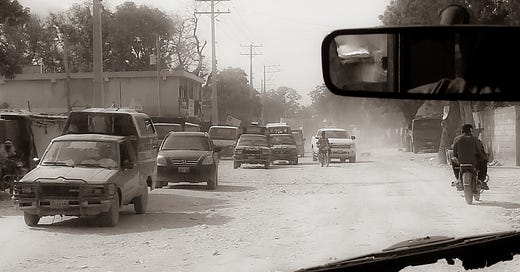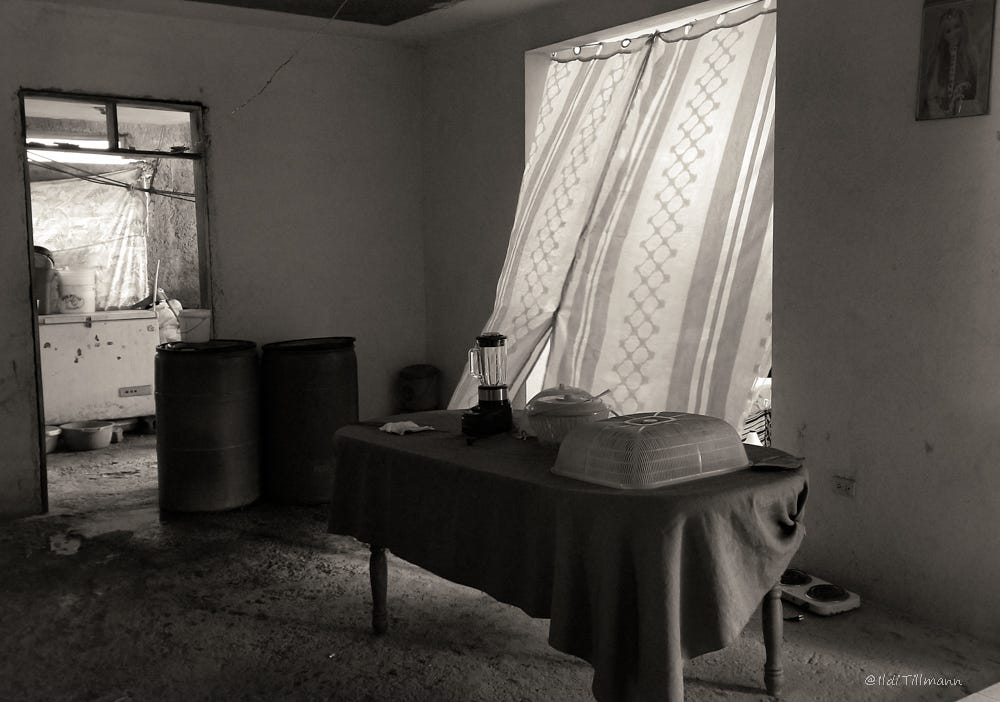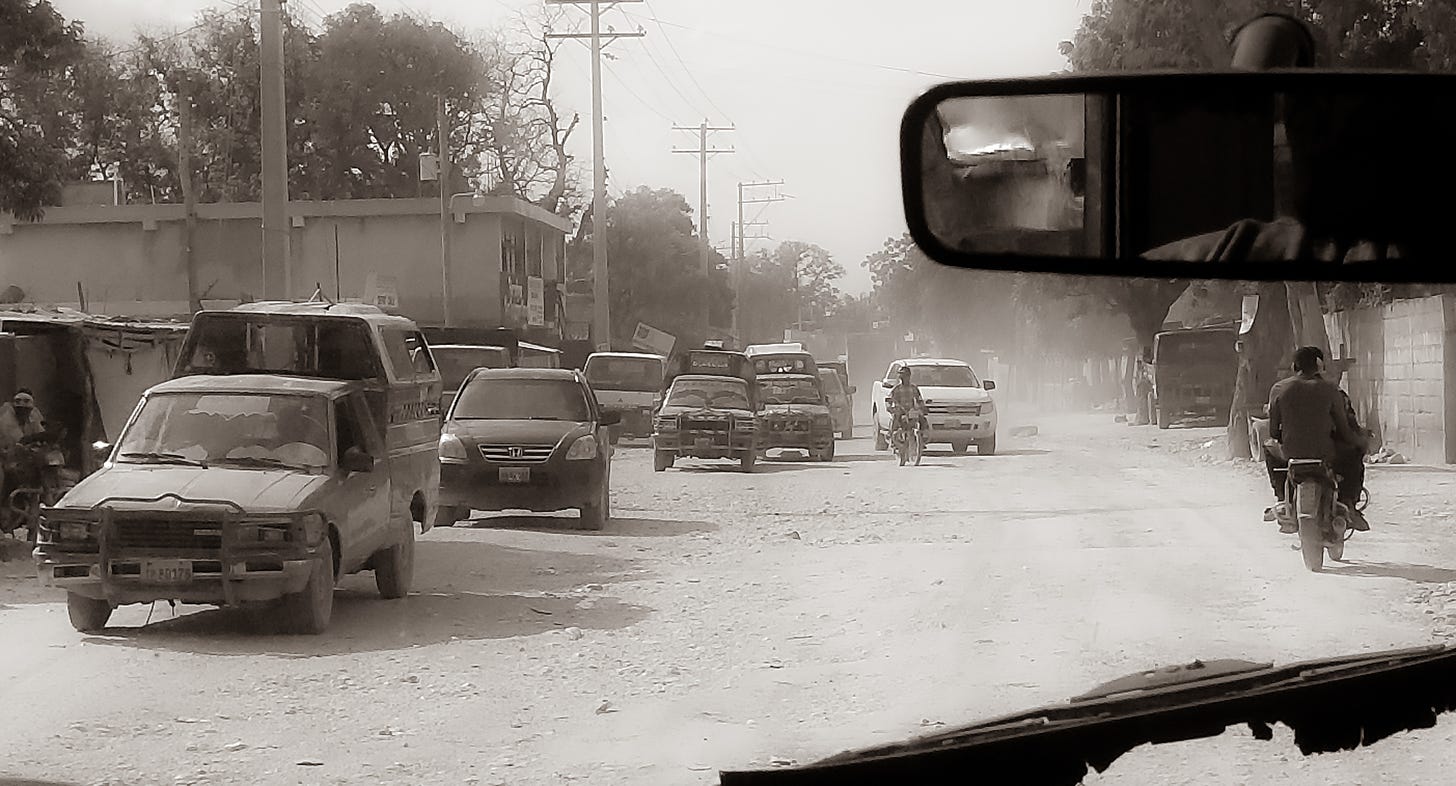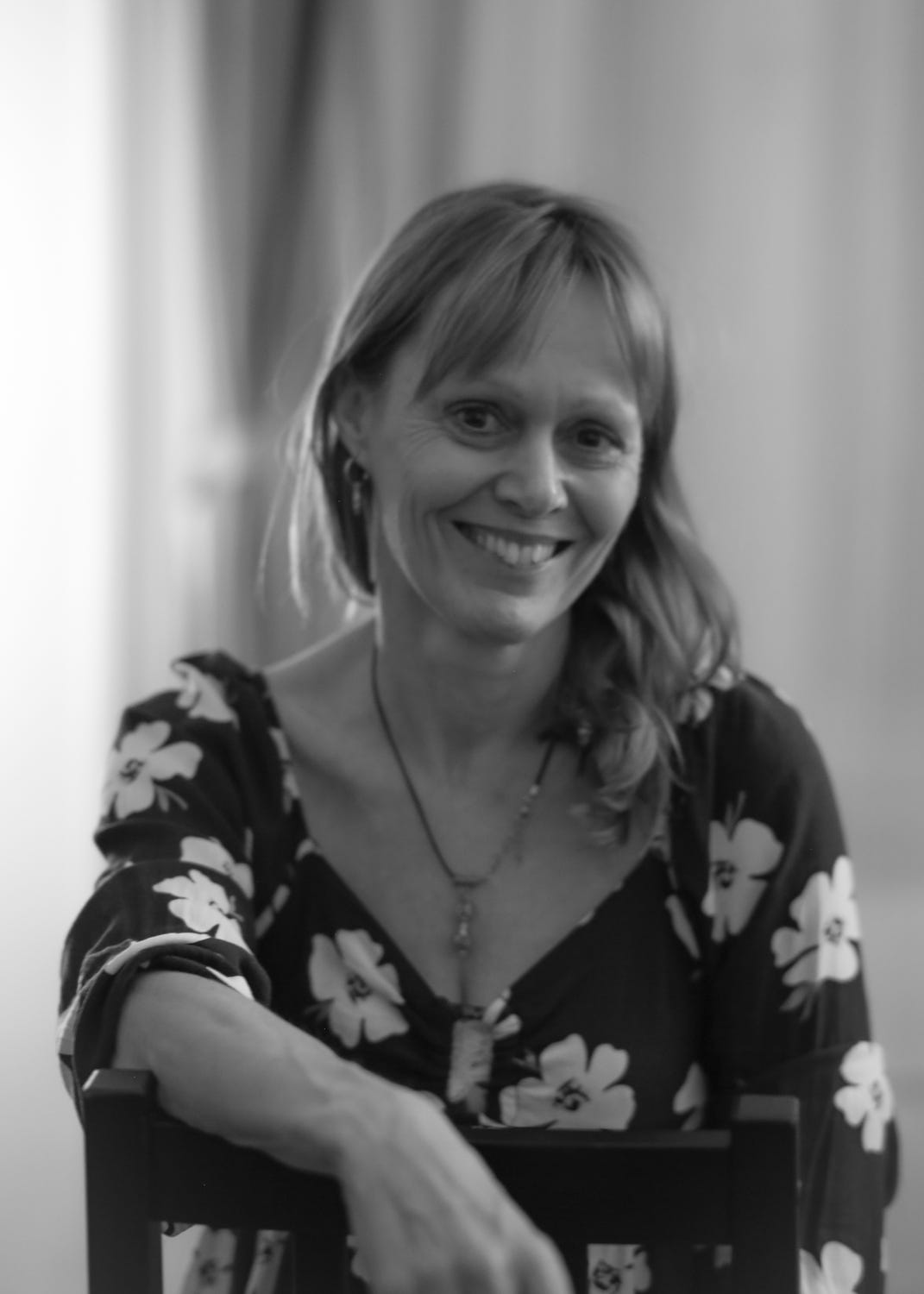Short story
THREE DAYS IN MARCH
A story from Port-au-Prince, Haiti
Ildi Tillmann (text and photos)
For Nathalie and her sonMarch 26th
It was a weekday, I had to wake up early to cook breakfast for my son, Johnny, before he went to school. I glanced over at his bed, alongside the opposite wall of the room, and I saw that he was already awake, scrolling down on his phone, texting. “They must have given electricity for a few hours during the night,” I thought to myself.
Johnny looked up and saw that I was sitting on the bed. “I will go get you water to wash,” he offered, put down the phone and slid his feet into the plastic slippers placed by his bedside before he went outside. The room felt fresh from the cool air of the night and for a few minutes I just sat there, listening to the early-morning noises coming from the street—the roosters’ cocky announcements, the barking dogs, the drawn-out sing-song of street vendors offering hard-boiled eggs and bananas for breakfast. Life with its usual murmur was expecting all who just woke up to join its daily twirl.
Johnny went to the front porch, filled a bucket with water from the large, plastic containers that serve everyone in the house and he carried it to the bathroom for me. My son has the moves of a lioness, soundless and watchful. Never conspicuous, but he takes careful note of everything that happens around him.
I got up and went to the kitchen to start the food. I texted Raoul, my cousin, to make sure that he would be here on time to pick up Johnny and take him to school. Over the past two months this has become our routine. There have been so many people taken in Port-au-Prince, it is better if Johnny doesn’t take a taptap, or is out on the streets by himself. I don’t have a car, cannot drive him. With Raoul, who occasionally works as a taptap driver and knows the streets and many people in the area, Johnny is safer anyway.
We followed our morning routine without speaking too much. Johnny has always been a quiet boy, sensitive, but the past year made him even more withdrawn. “He is a teenager,” his father tells me…. But Johnny’s silence became deeper since he had been taken, just over a year ago, from right outside his school.
It happened in the afternoon, after classes ended. Johnny was waiting in the school for his friend so they could catch a ride home together. A scuffle broke out on the street, somebody robbed or shot, or both. Johnny and some other students went outside to check what had happened, but all they could see was a man lying on the ground, bloody and visibly hurt, and two other men riding away on a moto, the one in the back brandishing a shotgun. People on the street were gathering around the wounded man, then some policemen arrived and started asking questions. One of them went up to Johnny and told him he needed to come with them to the precinct to write up a report of what he had seen, and told Johnny to get in a car with them. My son didn’t protest, so the man pushed him inside a vehicle which wasn’t a police car. He was gone for two days…forty-nine hours and thirty-three minutes...until Damien, his father negotiated him out, delivered the ransom money frantically collected from family members and acquaintances, and brought him back home. The men who took him demanded thirty thousand dollars for Johnny’s release, but Damien persuaded them to accept eight, placed under a rock by a sideroad, way outside of town.
The kidnappers collected the money while Johnny was still held; they only released him two hours later, at a different spot. Damien brought him home. Johnny said that they did not beat him; he appeared unharmed. He recounted the events to us, and for the next few days he stayed home from school and did not say a lot…. He turned sixteen a week later. We got him an American-style birthday cake, hoping that it can help him forget. There wasn’t much mention of those two days after that. Sometimes, when I attempt to tease out something about how he felt, he looks at me and says “It is alright, Ma’, it’s behind me. I don’t think about that.”
An hour later, Raoul arrived. I offered him coffee with some boiled eggs and we made small-talk, while he was having breakfast.
“How is your mother?”
“You know, hanging in there. My sister’s kids keeping her busyyyy...,” my cousin said this with a tone that signaled his nieces were a handful, and we laughed. When Raoul was done with the coffee, he and Johnny got in the car.
“Be careful, and don’t annoy your uncle on the way,” I reminded Johnny, like I did every other morning. I gave Raoul some of the food I made, tapped the roof of his car and then set them on their way.
“Off you go. I will see you tonight.”
Then I went inside and texted Suzi to ask if I could stop by her shop in the afternoon. I needed a haircut.
My coworkers, Jimmy and Soraya, arrived late, they had been held up in the rush-hour traffic of Port-au-Prince mornings. We work at Human Rights for Haiti, a US-based non-profit; Jimmy as a security guard, Soraya and I as secretaries. We belong to the lucky few who hold relatively stable employment. Jimmy has a car so he picks me and Soraya up every morning and we pitch in with the gas money.
Driving along the dust-filled roads of the city we were joking, and arguing whether to keep the windows up or down. If we keep them down, the dust and the exhaust fumes of the vehicles sting our eyes, but if we roll them up, the inside of the car gets unbearably hot and stuffy.
“We had them down yesterday, they should be up today,” reasoned Soraya, while Jimmy rested his elbow in the fully rolled-down driver-side window, busy flirting with girls on the street who ignored him or brushed him off with a teasing riposte. I didn’t mind the windows being rolled down so I let them fight this out, relaxing in the back, listening to the music blasting from the car radio. A few minutes later, to shift the conversation from the issue of the windows, I asked Soraya whether her baby had been fussy last night and she told me that he woke her up twice to feed.
“Oooohhh, six months old and still feeding twice at night! A man for you, eh!,” and we all laughed. Soraya forgot about the windows and took out her phone from her purse, to make a call.
We were heading into Martissant, a neighborhood with heavy gang presence. Jimmy took the side-streets, as people who are from the area would do, trying to avoid being conspicuous. Toddlers and young children dressed in torn pieces of clothing hung out by the side of the road, jumping in dirty puddles, chasing each other. People went about their business, motos sped by, leaving us behind.
We managed to get through Martissant without any trouble and I felt a sense of quiet relief. We were coming up towards the beach, near Carrefour, where my mother used to bring us once a year when my sister and I were kids. We were about fifteen minutes away from the office. My eyes were trying to catch sight of the sparkling blue of the sea, when I noticed that Jimmy quieted the music and slowed the car a bit. Soraya, who was still on the phone, said: “I’ll call you back” and she hung up.
I spotted the men, about two hundred meters ahead of us, a group of five, lingering alongside the unpaved strip of road. Two of them held rifles. Jimmy rolled up the windows, as if to erect a shield around the three of us. The men did not move, they were simply standing there, with eyes fixed on the passing cars. “In this area many people have guns…we drive here to go to work every day.” I tried to calm myself, but I sensed fear gripping my stomach. I felt sick. “A new roadblock, to check who passes through the area….”
We got closer to the men, and as the two with the guns moved towards the middle of the road, I saw a third one, pulling a machete from his pants.
March 27th
I must have dozed off for a couple of hours, but it is still dark outside. The room where we are being held is small and hot, the window opening blocked by wooden planks, letting through very little fresh air. In the background, I hear Soraya cry. I am in the corner, sitting on an old, dirty mattress, leaning my back against the wall. Jimmy is in another corner, his face is cut, his breathing labored and heavy. He says nothing, but I know that he is in pain. They beat him when they came and ordered Soraya to go to the other room with them. Jimmy tried to put in a word for her.
I hear Soraya from the next room, her pleas mingle with her curses and her cry.
“I have a six month-old baby at home who still nurses…”
I hear the men laugh, “Why not nurse me then tonight?”
Moans and shouts, Soraya must be fighting.
A slap on a face, “Shut up, bitch.” Bodies shuffle.
I cover my ears to muffle the sounds.
What would it take for Johnny to act like these men?
How much pressure would it take for him to comply?
I suppress the thought in my mind.
Twenty five hours have passed, more or less. Soraya is back. Not sure if Damien or the family members of Jimmy and Soraya have already been contacted. People who take others in this country tend to wait, keep the doubt and the fear running loose for about a day, let the relatives imagine the worst. Raise the stakes before naming their price. Our price…. On the news they talk about kidnappings but we tend to avoid that word, it makes things sound like scenes from an action movie…while these are our real lives. I gave them Damien’s number. I have known Damien for over twenty years, and I trust him with my eyes closed when it comes to matters like this, although, recently, we have been living apart.
I wonder if you have already been told, son. I wonder if you know that thinking about you is what makes me strong enough to get through this. I need to go back home to you.
I see your face in the dark. I am glad that you were not born a woman. To rape a man is a taboo around here, although God knows for how long. Taboos have been replaced, and our humanity is sinking under an ever-thickening crust of desperation, opportunism, and festive cruelty that have taken over our collective mind. Day by day, limits are redrawn. Limits to the desire to become a big man, a feared man, a hunting man...unless you are ready to be hunted.
I see your face in the dark. I hear your voice. “It’s alright, Ma’, I don’t think about that anymore.…” I need to get back home to you. I want to make sure that you grow up to be a different kind of man. A decent man, a humane human, no matter what.
After they were done with Soraya they took me to the other room as well, but when they realized how heavily I was bleeding from my period they brought me back here. I wasn’t appealing enough, my underwear soaked with blood. Then they sent a woman over with some water and pieces of cloth.
“Clean yourself up, dear,” the woman told me. She looked at Soraya. “Dogs…these dogs…,” she said, then left and returned with a towel and a glass of water. She handed them to Soraya without a word and left again.
It must be around noon. I can hear the men outside instructing someone to bring us food. Jimmy is pretending to be asleep. Soraya is next to me, on the mattress, her eyes are closed. She is silent. I feel a vague sense of guilt for being spared, spared by force of the same womanness that played to her disadvantage. And I am afraid.
“Do you want some water?” I ask Soraya and I hold the cup I have in my hand towards her. She accepts the drink.
“It’s not your fault,” she says, but she doesn’t look at me, “these coward sons of bitches only enjoy seeing blood when they are the reason it was spilled.” She is beyond fear, her voice filled with hate and anger.
I think about her baby boy, and of you, son, again. About the curses and the blessings of being a woman. How fast do our blessings run out? We should keep reminders of them at the depth of our hearts.
March 28th
I hear them talking to Damien on the phone. He asks to talk to me, or to any of us, but they don’t let him. They tell him to hurry up getting the money, if he wants to see us alive again. They gave him 48 hours, and that has almost passed. I hear the man threatening Damien, haggling with him over the price which is now down to fifty thousand dollars, for the three of us. Impossible amounts. The man goes outside of the house, towards the street-side. I miss the rest of the conversation.
Forty-nine hours have passed. I was up all night, I am exhausted. The TV next room was on for hours, the government must have given electricity. We could hear segments from a telenovela, then explosions from an action movie. Later, rap in Creole then love songs in French.
The men did not take Soraya this time, so we spent the hours of darkness lying on the mattress all three of us, next to each other. Jimmy’s face is swollen, his eyebrows caked with blood.
“My uncle will give money. My sister, she is in Florida. People we know will all pitch in. Perhaps even our boss…”
“Better to pay towards our ransom than towards our funerals,” Jimmy reasons. Soraya keeps quiet. I think about her husband. Outside the house, children are running and laughing, playing tag. I can hear the noise of women washing and cooking in the neighboring yard. Music blasts from a nearby house.
“Neighbors are like family,” my mother used to say. This is a small country, aren’t we all neighbors? Jimmy looks at me and as if guessing my thoughts he says, “Werewolves are the hardest to spot when they are inside your family…that is what my mother told me.” I must have said aloud what was on my mind...Weren’t all werewolves human one day? What would it take to turn them back to people?
Fifty hours have passed. The woman from last night brought us fried plantains to eat. Soraya doesn’t touch them.
“You have to eat,” I tell her. “Think about your baby. We don’t know how long this is going to last…”
Soraya opens her eyes.
“It won’t be that long before they kill us if we don’t pay up,” her voice is bitter.
Jimmy picks up a plantain and nudges Soraya to sit up. He hands her the plantain.
“They won’t kill us. They want the money.”
“They killed that French couple. Or that schoolteacher, from Santo.”
“The French tried to resist being taken. And the schoolteacher’s family contacted the police. Put this out of your mind, chéri, and eat.” Jimmy sits up on the mattress next to Soraya and runs one hand gently along her hair. He is glad to have found something better to do than weigh the passing of time.
Fifty-five hours pass by the time Damien delivers the money. He clearly managed to negotiate a few added hours to the original lease on our lives. Our release is unspectacular, the men who deliver us to him park the car about two hundred meters up the dusty road from where he is standing, they let us out and drive away, leaving a cloud of dust in their wake. Damien starts walking towards us and we meet about halfway. His face is tired, sad. He reaches for my hand as we walk towards the car he came with.
“Are you alright?”
I nod. We climb into the car. I sit in the passenger seat, Soraya and Jimmy are in the back.
Damien is driving. I look over at his face. He keeps his eyes on the road but I sense the tears welling up in them.
“I am taking all three of you to a hospital,” he says, softly. “I called Soraya’s husband. He will meet us there.”
As we reach the main road the tension in my body is slowly giving way to relief and exhaustion. Traffic inches along, and I catch the prime minister’s voice on the radio from a roadside kiosk:
According to human rights organizations, kidnappings in the country have risen 300 percent over the past months…. Our government is determined to combat the insecurity tearing our country apart…. State institutions work closely with international NGOs to realize social programs.…
I sink back into the seat and look out the window. I watch the leaves of the palm trees waving in the wind, the dogs maneuvering between the cars on the street. I hear the honking of the motos passing us, I see the people by the side of the road offering mangoes, peanuts, and plantain for sale. I watch life in its undisturbed flow, and I know that we are back, flowing with it again.
Ildi Tillmann is a Hungarian photographer and author. She has been living in the United States for over twenty years. Ildi earned an MA in Africana Studies from SUNY Stony Brook in 2017. From 2017–2020, Ildi worked on an independent photography project in Haiti. Her experiences in Haiti inspired the essay, From Hungary to Haiti: Unique Histories, Universal Stories, formerly published in JFBT. Her current story, Three Days in March, is dedicated to the memory of Nathalie, the wife of a friend in Haiti. Nathalie was kidnapped twice during a ten year period and her son was kidnapped two years before Nathalie passed away. The story first appeared in The Caribbean Quarterly in 2022, a year after Nathalie’s second kidnapping.
Ildi's photography has earned international photography awards, and her essays have been published in Caribbean- and US-based journals. She is currently working on a multimedia project in collaboration with Cuban pianist and jazz musician, Elio Villafranca (see their collaboration in JFBT here), about the influence of clichés and slogans on the way people see the world. Through photography and music, Ildi and Elio hope to inspire conversations about the connections between methods of commercial advertising and of political propaganda in the contexts of Cuba and New York. To learn more about the project and to follow their work in progress, please visit the Captured Landscapes webpage. Don't forget to subscribe at the bottom of the page for updates and work-in-progress samples! The project has been honoured with financial support from the Shelby Steele Foundation.
You can see Ildi's work on her website or follow her on Instagram: @tillmannildi.







It is quite interesting the way the national media picks and chooses WHOSE misery to highlight, whose suffering to bring to the world, and whose can safely be swept under the rug ... heartbreaking story, as are all such examples of human sorrow.
So many heartbreaks in the world today--it is too easy to forget one horror when a new one pops up every day. I am thankful for the ones who bring the stories before us, do not let us forget.